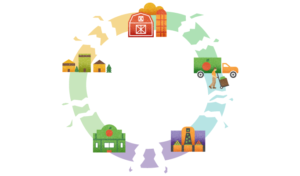While food supply chains snap, a solution is on the table
May 20, 2020
Source: The Hill's Changing America
Author: Oran B. Hesterman, PhD
Over the past few weeks, many have remarked upon the strange juxtaposition of images Americans have been confronted with: In the news, we see produce rotting in the fields and farmers pouring milk down the drains. Yet in our daily lives, we’re faced with empty grocery store shelves and, for an increasing number of American families, mile-long lines at food banks.
It doesn’t seem to make sense. Why can’t we get food to the people who need it?
In the 2008 financial crisis, we learned that no business is immune to global shockwaves. We are seeing the same thing happening today and in stark relief with our food system. Yet while the food supply chain offers a window into this current crisis, it also provides a way out.
The food industry has spent the past decades consolidating. In place of a diverse network of food and farm businesses that once anchored our communities, America’s food system, like many other systems, has evolved into one defined by long supply chains, global markets, and concentrated ownership.
This has some benefits. Consolidation creates efficiencies that allow us to distribute more food to more places at lower prices. But such efficiencies of scale come at a price of extreme fragility.
With the majority of food passing through relatively few facilities, if even one closes, the results are immediately seen on grocery shelves and felt in shoppers’ pocketbooks. Last month’s closure of just three processing plants took out 15 percent of U.S. pork supply. As the CEO of Tyson Foods, the largest meat processor in the U.S., recently wrote, “The food supply chain is breaking.”

And it is not just food that’s facing a supply chain crisis during this pandemic. In the equally critical health care system, supply chains for medical gear and drug components aren’t flexible or diversified enough to adapt alongside this crisis. After years of stretching supply chains for efficiency, many are ready to snap.
The question now is: How do we fix it? What solutions can help us respond to the current crisis and emerge stronger?
The answer for our food system is simple: The most important thing we can do today is support local farmers and the businesses that work with them, both with our dollars and policies that help them compete and survive.
A more resilient food system includes elements rooted in place — from farm to fork. Large producers and processors need to be balanced with regional farm and food businesses that can get food directly to people in their area.
It is businesses like these that demonstrate a more resilient way forward:
Common Wealth Poultry is the largest poultry processor in New England. It is not only serving up humanely raised chickens, it’s supporting a network of family farms across seven states while creating well-paying jobs in rural Maine.
Five Acre Farms sources from farms within a 275-mile radius of its Brooklyn headquarters. Its egg and dairy products can be found on grocery store shelves and traced back to the farms that produced them. It’s grocery store simplicity with farmer’s market accountability.
In Detroit, which has been particularly hard-hit by COVID-19, Chef Quiana “Que” Broden pivoted her demo kitchen and café to prepared meals. She’s now delivering locally sourced, healthy food to quarantine locations and feeding city employees who are working 24/7 on the pandemic.
And in Opelika, Alabama, local grocer Jimmy Wright is launching online SNAP purchasing alongside Double Up Food Bucks, which matches SNAP dollars spent on fresh produce to help families as well as the local farmers who have supported his family business for two generations.
We work with businesses like these every day at my organization, Fair Food Network. Our impact investing arm, Fair Food Fund, provides financing to mission-aligned businesses like Five Acres Farm and Cooking with Que, as well as business assistance to organizations like Common Wealth Poultry. Wright’s Market implements our Double Up Food Bucks SNAP incentive program, which is at farmers markets and grocery stores in 29 states. It’s innovative, local businesses like these that are not only adapting to meet community needs today but showing us what’s possible tomorrow.
This pandemic is giving us a wake-up call about the fragility of our supply chains, especially the one on which we all depend: Food. As we begin to examine what is too big to fail during this crisis, I hope we decide to invest in efforts that not only respond to today’s urgent needs, but also build the foundation for a stronger, more resilient future.
Oran B. Hesterman, PhD is the CEO of Fair Food Network and the author of Fair Food: Growing a Healthy, Sustainable Food System for All.
First published in The Hill’s Changing America on May 20, 2020.







